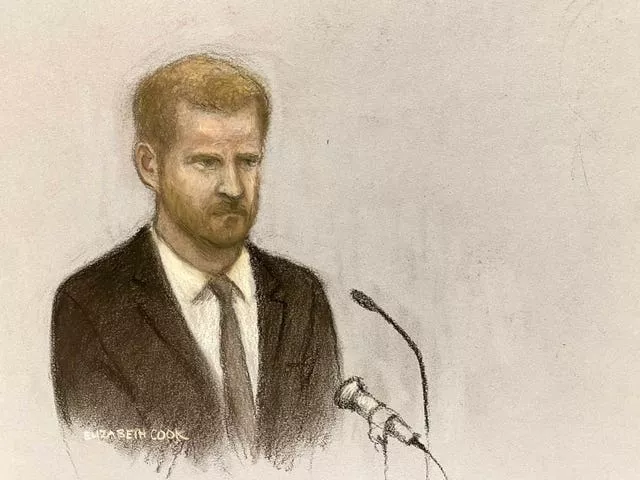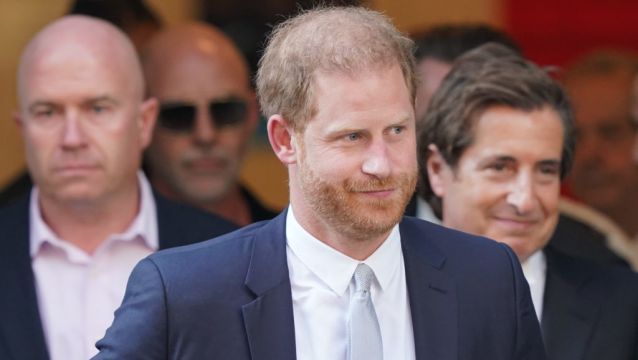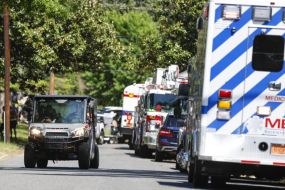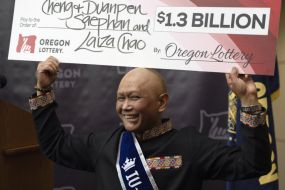Britain's Prince Harry was seen as a “prime target” by tabloid newspapers and the idea journalists would not have used illegal methods to gather information on him is “implausible”, the UK High Court has been told.
Harry, 38, is suing Mirror Group Newspapers (MGN) for damages, claiming journalists at the publisher’s titles were linked to methods including phone hacking, so-called “blagging” or gaining information by deception, and use of private investigators for unlawful activities.
Giving his closing arguments to the court in London on Wednesday, the Harry's barrister David Sherborne told Mr Justice Fancourt that Harry’s number appeared in the PalmPilot of a “prolific” phone hacker at MGN and that stories about the royal family “drove newspaper sales”.

Mr Sherborne said the targeting of Harry started when he was a child and “coping with the difficult situations in his life”.
He told the court: “The newspapers regarded him as a prime target in the sense that royal stories drove newspaper sales.
“That is why we say the idea that they would then not have used every opportunity to obtain stories, and to further stories written by other newspapers, is plainly implausible and they had the means to do so.”
He said there was no call data in relation to some of the 33 articles Harry complains of in his claim, but that the judge could rely on the “building blocks” of evidence in the case to make findings against MGN.
He said the “first and most important” of those is that the duke’s mobile phone number appeared in the PalmPilot of Nick Buckley, a former MGN editor who was found in a 2015 High Court ruling against the publisher to have been “one of the five most prolific” users of phone hacking methods.
Mr Sherborne described Mr Buckley’s PalmPilot as “a repository of numbers to hack” and said journalists at MGN titles were using Harry’s number to “hack into the Duke of Sussex’s mobile phone”.
The barrister also said the judge could make “an adverse inference” from MGN’s decision not to call the majority of journalists and editors involved in the articles complained of.
Mr Sherborne said that, where the court did hear from journalists who wrote the stories, they were not able to say where the information complained of in their articles had come from.
He reminded the judge that Jane Kerr, a former MGN royal correspondent, “could not explain” where quotes contained in an article had come from but “accepted she did not make them up”.
He said Harry had explained why he did not call certain witnesses including his former private secretary Jamie Lowther-Pinkerton, who previously settled a hacking claim against a different newspaper publisher, because he didn’t want to “drag him back into this”.
Andrew Green KC, for MGN, is expected to start his closing arguments on Wednesday afternoon.

Harry is one of four “representative claimants”, alongside actor Michael Turner, who is known professionally as Michael Le Vell and best known for playing Kevin Webster in Coronation Street; actress Nikki Sanderson; and comedian Paul Whitehouse’s ex-wife Fiona Wightman.
The allegations in their claims about unlawful activity at MGN’s titles – the Daily and Sunday Mirror and the Sunday People – cover a period from as early as 1991 until at least 2011, the court has been told.
The findings made by judge Mr Justice Fancourt in relation to the four will be used to determine the outcome of dozens of claims brought by others against MGN – including actor Ricky Tomlinson, the estate of the late singer George Michael, ex-footballer and television presenter Ian Wright and Girls Aloud singer Cheryl.
MGN is largely contesting the claims and denies that any of the articles complained of resulted from phone hacking, while contending that the vast majority did not arise from any other unlawful activity.
The publisher has made a limited number of admissions of unlawful activity in relation to the duke, Ms Sanderson and Ms Wightman, for which the publisher has apologised and accepted they will be entitled to some damages, but denies the majority of their claims and Mr Turner’s entire case.
Mr Sherborne said on Tuesday that the findings made in the 2015 ruling on the only other trial on unlawful information gathering at MGN were a “solid basis” on which the judge could base his own conclusions.
The trial is due to conclude on Friday and Mr Justice Fancourt will deliver his ruling at a later date.







